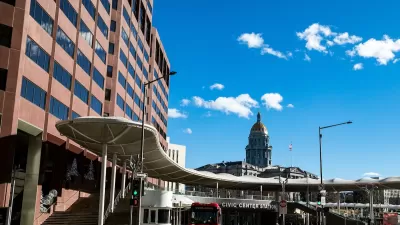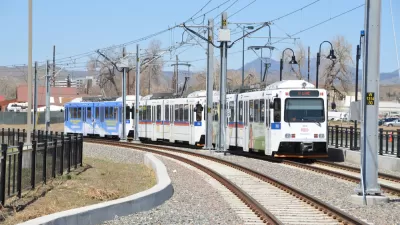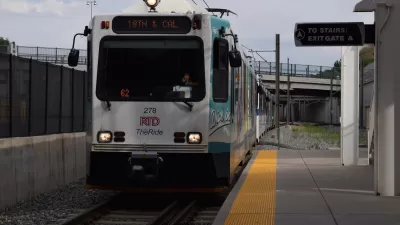The agency released a draft plan to eliminate regional zones, make airport trips more affordable, and reduce fares systemwide.

The Denver area Regional Transportation District (RTD) has unveiled a new draft plan for lowering fares, eliminating regional zones, and reducing the cost of monthly passes, reports Jon Murray in the Denver Post. The plan is based on the results of an “intensive systemwide study” undertaken by RTD in 2021. “The study’s mandate was to simplify RTD’s fare structure and reduce riders’ costs, which are at the upper end among U.S. transit agencies, especially for longer trips.”
Murray details the proposed changes, including lowering local fares and day pass fees, eliminating the regional fare, and reducing the cost of a monthly pass to $88, which would also include trips to the airport. The plan also suggests making fares free for youth under 19, increasing the low-income discount to 50 percent, and expanding its eligibility.
According to Murray, “More changes are possible, and RTD in the coming months will perform a federally required equity analysis to comply with civil rights laws.” The RTD board will vote on a final version in July, with new fares taking effect in early 2024.
The agency says it can afford the changes, since only 8 percent of operating expenses are covered by fare revenue, down from almost 16 percent before the Covid-19 pandemic. “The agency’s board briefing document projects that under the recommended fare and pass changes, revenue would drop next year to $73.5 million from $78.5 million, depending on whether the board approves a zero-fare youth pass pilot,” but ridership is expected to increase by 8 to 14 percent.
See the source article for more details on the proposed changes.
FULL STORY: RTD weighs cheaper fares and passes, with no regional zones — but airport trips still would cost much more

Alabama: Trump Terminates Settlements for Black Communities Harmed By Raw Sewage
Trump deemed the landmark civil rights agreement “illegal DEI and environmental justice policy.”

Study: Maui’s Plan to Convert Vacation Rentals to Long-Term Housing Could Cause Nearly $1 Billion Economic Loss
The plan would reduce visitor accommodation by 25% resulting in 1,900 jobs lost.

Why Should We Subsidize Public Transportation?
Many public transit agencies face financial stress due to rising costs, declining fare revenue, and declining subsidies. Transit advocates must provide a strong business case for increasing public transit funding.

Paris Bike Boom Leads to Steep Drop in Air Pollution
The French city’s air quality has improved dramatically in the past 20 years, coinciding with a growth in cycling.

Why Housing Costs More to Build in California Than in Texas
Hard costs like labor and materials combined with ‘soft’ costs such as permitting make building in the San Francisco Bay Area almost three times as costly as in Texas cities.

San Diego County Sees a Rise in Urban Coyotes
San Diego County experiences a rise in urban coyotes, as sightings become prevalent throughout its urban neighbourhoods and surrounding areas.
Urban Design for Planners 1: Software Tools
This six-course series explores essential urban design concepts using open source software and equips planners with the tools they need to participate fully in the urban design process.
Planning for Universal Design
Learn the tools for implementing Universal Design in planning regulations.
Smith Gee Studio
Alamo Area Metropolitan Planning Organization
City of Santa Clarita
Institute for Housing and Urban Development Studies (IHS)
City of Grandview
Harvard GSD Executive Education
Toledo-Lucas County Plan Commissions
Salt Lake City
NYU Wagner Graduate School of Public Service





























